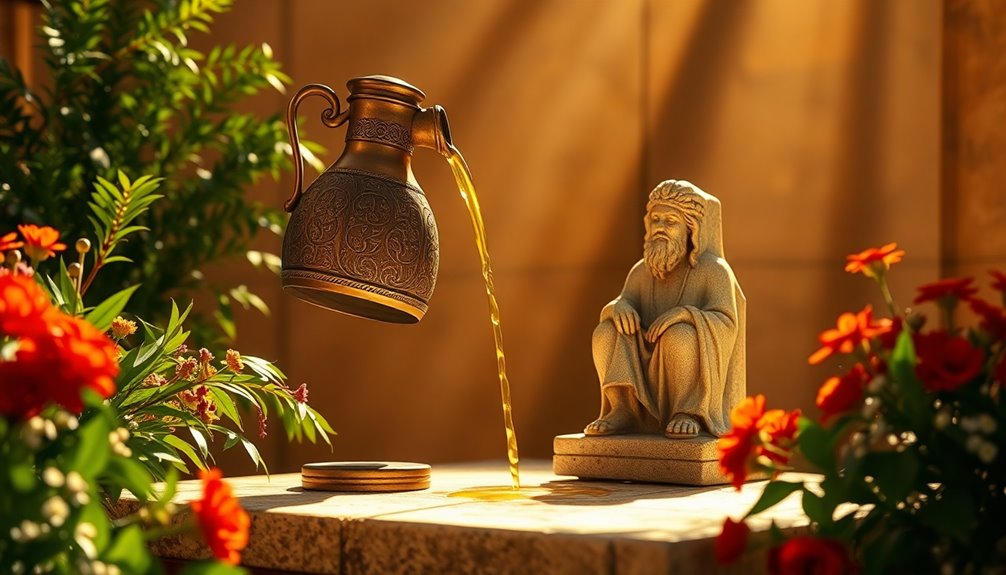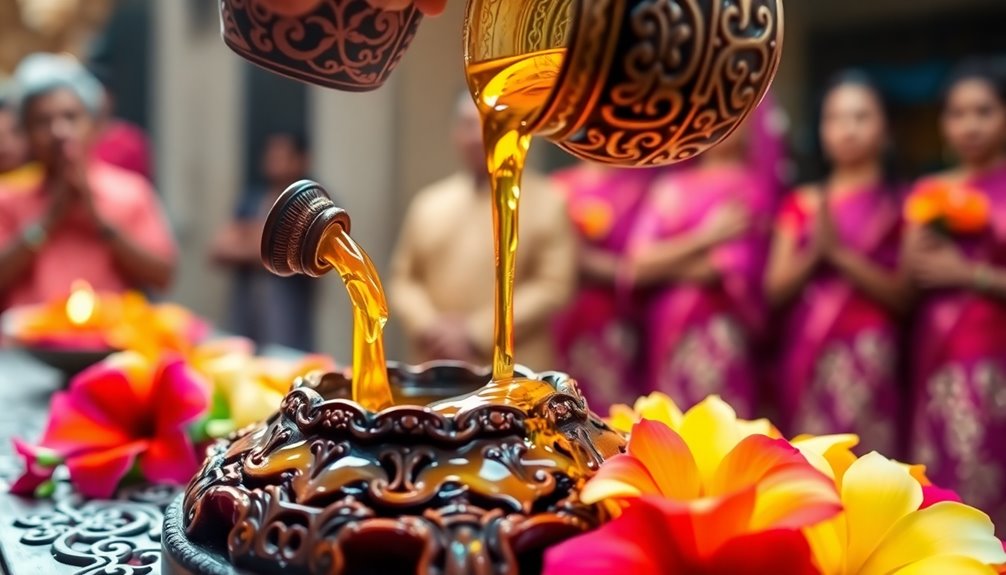Anointing is an important spiritual practice that symbolizes divine approval and empowerment. It involves applying oil or the Holy Spirit to convey a sacred purpose. While some may see it as a badge of honor, it's crucial to understand that anointing isn't linked to personal merits or rituals. The Holy Spirit's empowerment remains permanent, given to you at salvation, so you can't lose it. Anointing has deep roots in Scripture and cultural traditions, enhancing spiritual connections and community practices. There's much more to uncover about how anointing can transform your spiritual journey.
Key Takeaways
- Anointing symbolizes divine approval and empowerment through the Holy Spirit, not dependent on individual actions or rituals.
- In Scripture, anointing signifies divine authority, healing, and the selection of leaders, priests, and prophets.
- The practice of anointing has deep cultural significance, indicating hospitality and royal endorsement in ancient civilizations.
- Common misconceptions suggest anointing can be lost; however, Scripture teaches that it is a permanent gift from the Holy Spirit.
- Incorporating anointing rituals in daily life and community fosters spiritual connections and invites divine protection and blessings.
Introduction

Anointing, often seen as a powerful ritual, serves as a profound symbol of divine approval and empowerment. This practice involves the application of oil or the Holy Spirit, signifying that individuals are set apart for specific purposes. The Hebrew term "mashach" captures the essence of anointing, highlighting its significance in both ceremonial and personal contexts throughout history.
In ancient times, you'd find anointing used for various reasons: healing the sick, providing hospitality, and consecrating kings, priests, and sacred objects. The rich tradition of anointing doesn't stop there; it extends into the New Testament, where Jesus is celebrated as the Anointed One, or Messiah. This concept resonates with believers today, as many receive an anointing through the Holy Spirit, reinforcing their connection to the divine.
It's fascinating to see how anointing practices vary across different religious traditions. Each culture brings its unique interpretation and application, enriching the overall understanding of this sacred ritual.
Whether through oil or spiritual empowerment, anointing continues to play a vital role in the lives of many, reflecting a deep-seated desire for divine significance and connection.
Scriptural Insights on Anointing

When you explore the concept of anointing in Scripture, you'll find rich insights in both the Old and New Testaments.
Key references highlight how anointing signifies divine authority, healing, and spiritual empowerment.
Let's look at the primary and secondary Bible references that shape our understanding of this powerful practice.
Primary Bible References
Throughout the Bible, various passages illuminate the significance of anointing in both the Old and New Testaments. The Hebrew word "mashach" reflects the act of smearing or pouring oil, symbolizing God's choice and setting apart for holy purposes.
In Exodus 30:22-32, you see a detailed formula for anointing oil, reinforcing its sacred role. The anointing of David by Samuel in 1 Samuel 16:3 illustrates how God empowers leaders for their divine tasks.
Isaiah 61:1 speaks of a figure anointed by the Spirit to bring good news and heal the brokenhearted, which Christians recognize as Jesus Christ. In the New Testament, Luke 4:18 highlights Jesus' anointing, where He declares His mission to proclaim freedom and recovery of sight, fulfilling the prophetic significance of anointing.
Moreover, James 5:14 emphasizes the ongoing practice of anointing with oil for healing, showing its vital role in the spiritual and physical restoration of believers.
This practice connects the Holy Spirit upon Christians, underscoring how anointing remains essential throughout Scripture, both for leadership and healing.
Secondary Bible References
While exploring the theme of anointing in Scripture, you'll find that it recurs in various contexts, reinforcing its importance. In Exodus 30:22-33, God provides a specific recipe for holy anointing oil, emphasizing its sacred nature and the serious consequences of misuse. This oil isn't just a substance; it symbolizes divine selection and empowerment.
In 1 Samuel 16:13, when Samuel anoints David, it marks God's choice for the future king of Israel, indicating that the anointed one carries divine authority. Further, Isaiah 61:1 prophesies an anointed figure who'll bring good news to the poor and heal the brokenhearted, hinting at the messianic role of Jesus.
In the New Testament, Acts 10:38 confirms that God anointed Jesus of Nazareth with the Spirit of the Lord and power, equipping Him to do good and heal. This connection between anointing and healing continues in James 5:14, where believers are instructed to have elders anoint the sick with oil in the name of the Lord, linking physical healing with this holy practice.
Through these references, you see the profound significance of anointing in both the Old and New Testaments.
Ancient Israelite Anointing Rituals

Anointing rituals in Ancient Israel were significant practices that marked the divine selection of kings, priests, and prophets. These rituals typically involved individuals being anointed with oil, a sacred oil specially formulated from myrrh, cinnamon, and cassia, as outlined in Exodus 30:22-33. The act of anointing wasn't just a ceremonial gesture; it demonstrated God's empowerment for leadership and spiritual roles.
For instance, kings were anointed by established authorities, such as prophets or priests, with notable examples like Samuel anointing Saul and David (1 Samuel 10:1; 1 Samuel 16:13).
This ancient custom also extended beyond individuals to consecrate sacred objects, like the tabernacle and its furnishings, making them holy and dedicated to God's service (Exodus 30:26-29).
Moreover, anointing rituals conveyed social significance, reflecting hospitality and respect toward guests, as illustrated in Psalm 23:5. Thus, these rituals were deeply embedded in the cultural and spiritual fabric of Ancient Israel, signifying both divine appointment and community values.
Cultural Significance of Anointing

The significance of anointing extends well beyond the rituals of Ancient Israel, influencing various cultures throughout history. In many ancient civilizations, anointing served as a powerful symbol of hospitality and respect. For instance, in Egypt, it marked the induction of officials, while in Indian traditions, practices like abhisheka demonstrate its importance in both governance and spirituality.
In Judaism, anointing expresses the sanctifying nature of the ritual, using holy anointing oil to consecrate priests and kings unto divine authority. This act signified God's approval, establishing a direct connection between the high priest and the divine. Moreover, royal ceremonies often intertwined anointing with religious endorsement, highlighting the complex power dynamics between the Church and monarchy.
Across cultures, the oil used in anointing has varied meanings and significance. Different denominations adapt anointing practices, reflecting diverse interpretations of its importance in contemporary religious settings.
From ancient times to today, anointing remains a profound ritual, underscoring the sacredness of authority and the relationship between the divine and those who lead.
Misunderstanding Anointing's Spiritual Impact

You might think anointing is something you can lose or transfer, but that's a common misconception.
The truth is, the anointing you receive at salvation is permanent and meant to empower you for God's specific purposes.
Let's clarify these misunderstandings and explore the true impact of anointing on your spiritual journey.
Debunk Common Anointing Misconceptions
Many people hold misconceptions about anointing, leading to confusion about its true spiritual impact. One prevalent misunderstanding is the belief that anointing can be lost or stolen. Scripture, however, assures you that the anointing received through the Holy Spirit is permanent (1 John 2:27).
You might also think that specific "new anointings" are essential for empowerment, but all believers receive the fullness of the Holy Spirit at salvation (2 Peter 1:3).
Another common misconception involves the idea of "Mimshach anointing," which incorrectly ties spiritual authority to Lucifer's fall. This notion deviates from orthodox beliefs and can mislead you.
Some teachings suggest you should seek additional anointings for enhanced spiritual gifts, but this focus can distract you from recognizing and using the gifts already granted by the Holy Spirit (1 John 2:20).
Ultimately, it's crucial to understand that anointing signifies God's presence and empowerment for a godly life, rather than a mere ritualistic experience or temporary status.
Embrace your identity as an anointed one, and trust in the Holy Spirit's work within you for true spiritual growth.
Misinterpretation of Anointing's Purpose
Anointing often gets misinterpreted as a badge of honor or a measure of spiritual performance, leading to confusion about its true purpose. Many believe that the Holy Spirit's divine empowerment depends on individual actions or external rituals, but that's a significant misinterpretation.
In reality, your anointing is a permanent gift received at salvation (1 John 2:27). Some teachings even suggest that you can lose your anointing, which contradicts the assurance that the Holy Spirit remains with you forever (Ephesians 1:13-14).
The idea of "new anointings" can distract you from recognizing the sufficiency of the empowerment you've already received (2 Peter 1:3).
Moreover, associating anointing exclusively with physical oil misses its deeper spiritual significance. Instead, it symbolizes your connection to God's presence and purpose (1 John 2:20).
Daily Anointing Rituals

You might find that daily anointing rituals can transform your spiritual practice at home and in community settings.
By incorporating oil into your morning routine or participating in group anointing services, you invite divine protection and blessings into your life.
These practices not only enhance your connection to the Holy Spirit but also create a shared experience of faith and intention.
Daily Anointing Practices at Home
While starting your day, incorporating daily anointing practices at home can create a powerful spiritual ritual. By using consecrated oil, you invoke blessings and protection for yourself and your loved ones. Consider making it a part of your morning prayer or meditation. As you apply oil to your forehead, wrists, or heart, recite affirmations or scripture to deepen your spiritual connection.
You might also choose to anoint the entrances of your home. This not only invites God's presence but also symbolizes protection within your living space. It can be a beautiful tradition for your family, reinforcing a sense of safety and divine favor.
For those seeking healing, daily anointing can play a vital role. Applying oil to areas of discomfort while praying for restoration connects both the physical and spiritual realms. Using specific oils, like olive oil mixed with frankincense or myrrh, enhances the sensory experience, making your ritual even more meaningful.
These daily anointing practices create a sacred space in your life, fostering a deeper awareness of blessings and divine protection throughout your day.
Group Anointing Services
Unity thrives in group anointing services, where the collective application of consecrated oil fosters a sense of shared purpose among participants. During these rituals, you and others in your faith community come together, often during significant church events like healing services or worship nights.
As you receive the oil, you feel the spiritual connection to those around you, reinforcing that you're not alone in your journey. In these moments, you're anointed with prayers aimed at empowerment, healing, and divine guidance. This aligns your intentions with the community's spiritual goals, creating a powerful atmosphere of collective faith.
Biblical precedents, such as James 5:14, remind you of the importance of this communal act, where church elders anoint the sick as a show of support and belief. Accompanied by worship, testimonies, and teachings, group anointing services become a space for spiritual renewal.
You witness firsthand the transformative power of shared prayers, knowing that healing isn't just personal but a community endeavor. Together, you cultivate a vibrant, loving environment that nurtures your faith and strengthens the bonds within your community.
Anointing's Transformative Spiritual Significance

Anointing serves as a powerful symbol of divine empowerment, marking individuals and objects for sacred purposes. In both spiritual and ceremonial contexts, anointing signifies God's approval and presence, as seen in biblical references like Exodus 30:22-32.
When you receive anointing, particularly through the Holy Spirit, you're not just participating in a ritual; you're experiencing the transformative power that liberates you from spiritual bondage. Isaiah reminds us that "the anointing breaks the yoke," highlighting how this act empowers you to overcome challenges and fulfill your divine assignments.
Moreover, spiritual anointing grants you spiritual authority, guiding you toward your true purpose. Just as Jesus was anointed to fulfill His role as the ultimate priest and king, you too are called to embrace your God-given mission.
Additional Resources

Exploring the rich topic of anointing can be greatly enhanced by utilizing a variety of resources available to you. One excellent starting point is the video series "Royal Priesthood," which consists of six episodes that dive into the significance of anointing in biblical contexts.
Additionally, the podcast series "The Anointed" offers seven episodes that explore the theological implications and practices of anointing, enriching your understanding further.
To support your Bible study, take advantage of the free resources provided, including advanced reading tools and community-contributed materials on anointing and related topics. These tools can deepen your grasp of how anointing from the Holy Spirit plays a role in your spiritual journey.
You'll find additional resources such as quizzes and community support to help you discover your unique purpose in the practice of anointing.
As you engage with these materials, look forward to upcoming content planned for 2025, focusing on the ongoing significance of anointing in today's context. With these resources at your disposal, you can truly embrace the transformative power of anointing in your life.
Frequently Asked Questions
What Is the Spiritual Meaning of Anointing?
The spiritual meaning of certain practices often involves a deep connection to the divine, signifying empowerment and purpose in your life.
When you engage in these acts, you're recognizing God's presence and inviting His guidance.
It's about embracing your role in a greater plan and allowing divine authority to flow through you.
Such moments can reveal truths and strengthen your ability to fulfill your unique calling within the spiritual realm.
What Do You Mean by Anointing?
When you hear the term, it often relates to a special act of setting someone apart for a significant purpose.
It symbolizes a divine selection or empowerment, indicating that the individual is chosen for a specific role or mission.
This act can involve the application of oils or a spiritual blessing, signifying that they've a unique responsibility or calling in their life, often within a religious or cultural framework.
What Are the Three Types of Anointing?
When you explore the three types of anointing, you find material, spiritual, and ceremonial.
Material anointing involves using oil for physical care and hospitality.
Spiritual anointing empowers you through the Holy Spirit, guiding your faith journey.
Lastly, ceremonial anointing sets individuals apart for special religious roles, like priests and kings.
Each type serves a unique purpose, enhancing your understanding of divine favor, empowerment, and sacred appointments in your spiritual life.
What Does the Bible Say About Anointing?
The Bible discusses anointing as a symbol of God's choice and empowerment. It highlights how God selected individuals for specific roles, like kings and prophets, through this act.
You'll find that anointing signifies divine approval and a special connection to God's purpose.
The New Testament emphasizes Jesus as the Anointed One, while believers receive an anointing through the Holy Spirit, empowering them for service and guiding them in truth and discernment.










